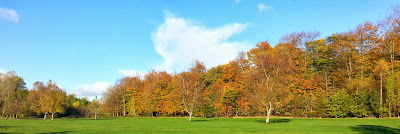Connecting with Nature

With fresh reports on how disconnected we are becoming from nature, we took the opportunity this fine weekend to reconnect, see what's out there and get muddy. The changing seasons show Glasgow's parks at their best. Here is Pollok. A riot of colour. Down by the river. In the bright sunlit woods By the old stable block. In the walled garden. Leaves on fire. Mushrooms. Trees. Ornamental Gardens. Leaves. Berries.


